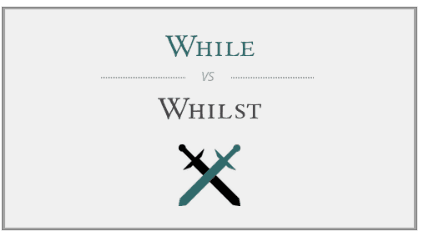While vs Whilst: Word Preferences Across Different Regions
Contents

Navigating the English language can be a rewarding journey, but sometimes, it's like walking through a dense forest! Take 'while' vs 'whilst' for instance. Knowing when and where to use these terms can significantly enhance your communication skills. As you start the journey of mastering English with us today, you'll discover that small changes can make a big difference!
In this blog, we will look into the meaning, usage, and differences between ‘while’ and ‘whilst’. We will explore their unique roles in different dialects of English such as British (UK), US and Australian English. Get ready for an exciting journey ahead!
Is There a Difference Between 'While' and 'Whilst'?
Let us start by looking at the meaning of while vs whilst. At their core, both 'while' and 'whilst' carry similar meanings, both primarily used to represent the idea of "during the time that" or "at the same time as". However, there are subtle differences in their usage. Let's break them down:
While: This term is universally used in both British and American English.
Whilst: Predominantly used in British English, it's often considered formal or old-fashioned.
Despite these differences, you can generally use 'while' and 'whilst' interchangeably without altering the meaning of your sentence. However, being aware of these differences can help you tailor your language according to different contexts. For instance, if you're writing a formal letter for a UK-based company, using 'whilst' can add an elevated tone to your message.
When to Use While vs Whilst: Practical Guidelines
Let's dive into some while vs whilst examples to illustrate the usage of both words. Suppose you're reading a book and sipping your coffee, you'd say "I enjoyed my coffee while reading". Alternatively, if you prefer a more formal tone or are writing for UK or Australian audiences, you might also say "I enjoyed my coffee whilst reading".
Notice how the context doesn't change? That's because 'while' and 'whilst' have the same meaning. However, their usage varies across different English-speaking regions. For example, in the UK, while and whilst are both understood. 'While' is more common in everyday speech whereas 'whilst' is often used in formal writing or traditional contexts. In the case of while vs whilst in Australian English too, you'll find both terms being used interchangeably.
Let's simplify this further with a comparison table:
Words | Regions | Example |
While | American, British (UK), Australian English | I listened to music while doing my homework. |
Whilst | British and Australian English | He made notes whilst listening to the lecture. |
Remember these guidelines next time you're unsure of which one to use. For more on regional differences in English across the world check out the Clapingo blog post on Exemplary English: Identifying the Most Linguistically Precise Nation.
Use these practical rules when choosing between using 'while' vs 'whilst', and sound like a native speaker regardless of where you are!
Practice Makes Perfect: Some Engaging Exercises

Mastering the usage of 'while' and 'whilst' needs practice. Let's look at some engaging exercises that could help you understand their use better.
1. Dialogue Scenario: Imagine you're describing a recent incident to a friend. Try crafting sentences using both 'while' and 'whilst', like, "I was sipping my chai while reading the newspaper" or "I finished my report whilst working from the office."
2. Personalised Example: Write a diary entry about your day, consciously using 'while' and 'whilst'.
Don't forget to check out the Clapingo IELTS Series on YouTube for more practice exercises: Don't forget to check out the Clapingo IELTS Series on YouTube for more practice exercises:
Explore More: Enhancing Your Vocabulary
Expanding vocabulary is vital for English fluency. Here are other commonly confused English word pairs whose usage varies regionally:
Color vs Colour: While 'color' is the American English spelling, 'colour' is used in British English.
Realize vs Realise: Americans spell it as 'realize', while British English speakers say 'realise'.
License vs Licence: In UK English, ‘license’ is a verb, ‘licence’ is a noun; but in US English, both are spelled as ‘license’.
Remember, exploring a language and learning new words should not feel like a chore but rather an exciting journey towards fluency, so keep pushing yourself and stay curious!
Clapingo Can Help: Achieving Fluency with Personalised Coaching
Many non-native English speakers in India struggle with understanding and using confusing vocabulary, including the tricky-looking 'while' vs 'whilst'. They often feel overwhelmed by the complexities of English grammar and vocabulary that can make or break their communication.
Here's where Clapingo comes in. Clapingo's personalised coaching sessions, conducted by native speakers, help learners understand and use English words and phrases correctly. The one-on-one classes focus on clarity in expression and accuracy in using terms like 'while' and 'whilst', making your journey to fluency a lot smoother.
Check out this YouTube video to learn more: Clapingo, where you can practice conversations and hone your English speaking skills.
Key Takeaways
So, we've unravelled the confusion of 'while' vs 'whilst'! Remember, while both words technically mean the same, 'while' is more commonly used globally. On the other hand, 'whilst' has a more formal tone and is primarily used in British and Australian English.
As you travel the path towards English mastery, remember that learning is a continuous process filled with rewards and challenges. Stay motivated! Don't hesitate to explore resources like Clapingo that can help you hone your skills further. After all, mastering English is not just about language proficiency; it's about connecting with people worldwide!
FAQs
1. Can I start a sentence with whilst?
Of course! It usually depends on the context. For example, you can say "Whilst I enjoy playing cricket, I also love watching football."
2. Can I use whilst in writing?
Yes, it’s perfectly fine to use 'whilst' in writing, especially within formal or British contexts.
3. Why do Australians say whilst?
It's primarily because 'whilst' is more prevalent in British English which has influenced Australian English over time.
Comments
Your comment has been submitted